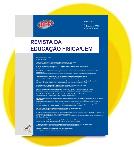Association between motor performance, cognitive maturity and socio-demographic aspects in preschooler children
Abstract
The identification of low motor proficiency in children of preschool age allows intervention programs to be proposed, to minimize the losses in school activities, social relationships and Physical Education classes. Thus, identifying the factors underlying low motor performance is essential, in an attempt to reduce possible motor disorders. The objective of this study was to investigate the association between motor performance, cognitive maturity and sociodemographic aspects in preschool children from Paraná. The participants were 357 preschoolers from 3,5 years to 5 years. The Columbia Mental Maturity Scale, Movement Assessment Battery for Children-2 test and a sociodemographic data sheet were used. For statistical analysis, the Kolmogorov-Smirnov, Friedman (Wilcoxon) and binary logistic regression tests (p<0.05) were used. There was a high prevalence of low motor proficiency (16.8%), cognitive maturity (CM) on average age (67.2%) and socioeconomic level >R$1,500, 00 (45.5%). A significant association was observed between higher CM and low motor proficiency, indicating the upper CM as a protective factor for low motor proficiency (OR 0.513 IC 95% 0,266-1,000). The socio-demographic factors were not intervening in the motor performance (MP). It was concluded that the upper CM in children in early childhood acts as a protective factor for the low motor proficiency and that the socio-demographic factors of the family were not associated with MP and the CM of the preschoolers.
Downloads
Copyright (c) 2020 Journal of Physical Education

This work is licensed under a Creative Commons Attribution-NonCommercial-NoDerivatives 4.0 International License.
• Authors retain the copyright and full publishing rights without restrictions.

This work is licensed under a Creative Commons Attribution 4.0 International License.













_1502.jpg)











